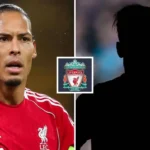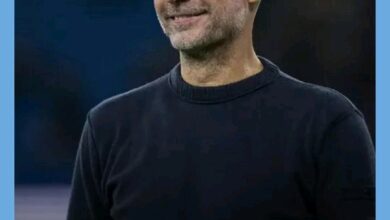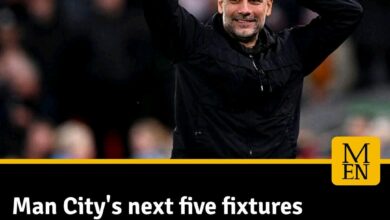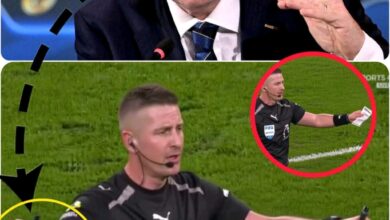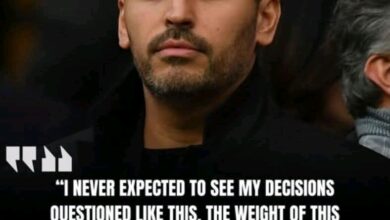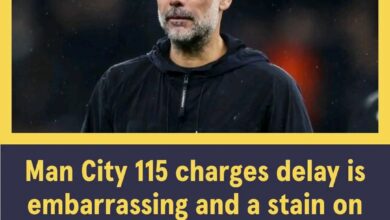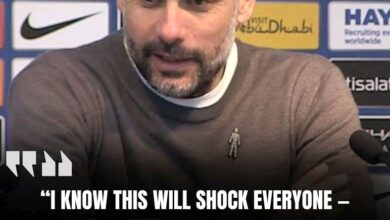Final decision have been taken ,on Manchester City vs Liverpool
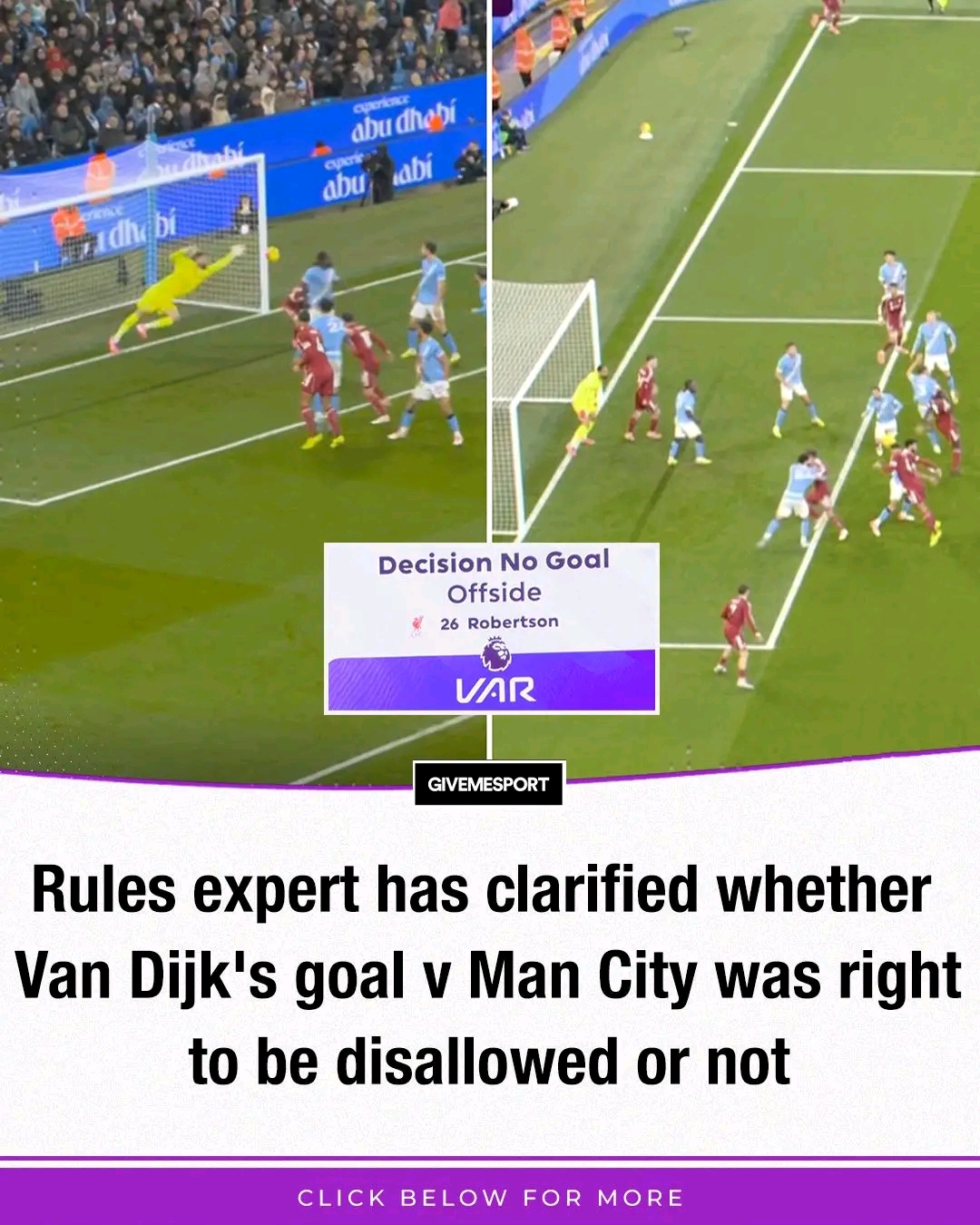
It was supposed to be another exciting Premier League clash between Manchester City and Liverpool, two clubs who have battled for English football dominance in recent years. But instead of the football being the main talking point, it was the referee’s decision that stole the headlines once again. In a heated atmosphere at the Etihad Stadium, one moment changed everything. It was the kind of decision that could define a title race, destroy confidence, and spark outrage across the football world. When Virgil van Dijk rose high to head home a goal for Liverpool, the red half of England believed the comeback had begun. But seconds later, the flag went up. The referee disallowed it. The stadium roared, the Liverpool bench froze, and the replay screens told a story that left millions speechless.
Manchester City went on to win 3-0, but that scoreline barely told the full story of what had happened. The talking point was simple – should Van Dijk’s goal have stood? Former Premier League referee Mark Halsey didn’t hesitate. He looked at the footage, analyzed the situation, and declared with full confidence that the officials got it wrong. The retired referee, who once commanded some of the league’s biggest games, made his feelings clear. For him, that goal should have counted. It was a moment that showed how far VAR has changed football and how confusion around the laws continues to create frustration for players, managers, and fans alike.
It all began early in the match when Manchester City looked dangerous. Jeremy Doku, the young Belgian winger, was electric from the first whistle. Every time he got the ball, Liverpool’s defense panicked. He drove past defenders, drew fouls, and created chaos. It was Doku who won City their first big chance when he darted into the box and forced Liverpool’s defenders into a desperate challenge. The referee pointed to the spot, the crowd roared, and all eyes turned to Erling Haaland. The Norwegian stepped up, ready to add another goal to his record-breaking tally. But to everyone’s shock, Giorgi Mamardashvili guessed right and saved it. Liverpool fans cheered. For a brief moment, it felt like it might be their day.
But Manchester City are a team that don’t stay down for long. Haaland, known for his ruthless mentality, didn’t take long to respond. Minutes later, he found himself with another chance, and this time, he buried it. The Etihad exploded in celebration. Pep Guardiola jumped in the air, punching his fist toward the fans. The goal put City in control, and soon after, Nico Gonzalez doubled their lead before halftime. Everything was going their way – until Van Dijk thought he had changed it all.
Liverpool won a corner just before the break. The ball was whipped in perfectly, and Van Dijk rose above everyone, as he has done countless times. His header was powerful, precise, and flew straight into the net. The Liverpool players ran toward the corner flag, celebrating passionately. But as the players hugged, the whistle blew. The assistant referee had his flag up. The goal was under review. And moments later, it was ruled out.
Andrew Robertson, standing in an offside position, was judged to have interfered with the goalkeeper. The VAR check confirmed the decision, and the goal was disallowed. Liverpool’s bench erupted in anger. Arne Slot stood frozen for a few seconds, then turned to the fourth official demanding an explanation. The players surrounded the referee, but the decision was final. The goal did not stand.
For Liverpool fans watching around the world, confusion filled the air. Replays showed Robertson standing near Manchester City goalkeeper Gianluigi Donnarumma, but not touching him. Robertson didn’t play the ball, didn’t block the keeper’s vision, and even ducked as the header came toward goal. So how could that be offside? That was the question Mark Halsey tried to answer.
Halsey, who refereed over 280 Premier League matches during his career, didn’t mince words. He said the goal should have stood. For him, Robertson’s positioning wasn’t enough to rule it out. He explained that being in an offside position alone is not a crime in football; it only becomes an offense if the player interferes with play or blocks the opponent’s vision. In this case, Halsey said, Robertson clearly didn’t interfere. Donnarumma could see the ball all the way. The Liverpool defender didn’t touch it, didn’t block anyone, and even ducked out of the way. Halsey said simply, “If that flag doesn’t go up, that goal is given.”
His words hit hard because they reflected what millions of fans were thinking. For many, the beauty of football lies in moments like that Van Dijk header – raw, powerful, emotional. To see it erased because of a technical interpretation of the offside rule felt wrong. And for Arne Slot’s Liverpool, the disallowed goal changed everything.
At that point, the game was 2-0. A goal before halftime could have changed the momentum completely. It would have given Liverpool hope, energy, and belief going into the second half. Instead, it broke them. Manchester City smelled blood and came out even stronger after the break. Doku, who had been brilliant all day, capped off his performance with a stunning goal just past the hour mark. The score became 3-0, and there was no coming back for Liverpool.
For Pep Guardiola, it was a perfect night – a 1000th game as a manager marked with a dominant win over one of his fiercest rivals. But even he knew that the controversy around Van Dijk’s goal would overshadow everything. When asked after the match, Guardiola only smiled and said, “I didn’t see it clearly.” It was his way of avoiding the storm that was already building.
For Arne Slot, the pain was deeper. His Liverpool team had now lost four consecutive away league games. The defeat left them eight points behind league leaders Arsenal. The Dutch coach could feel the pressure building. He had only been in charge for a short time, but at a club like Liverpool, expectations are always high. Fans demand results, and patience is thin when it comes to failure.
As Arsenal drew 2-2 with Sunderland the day before, this was Liverpool’s chance to close the gap. Instead, they found themselves slipping further away. Manchester City’s win took them to second place, just four points behind Arsenal, and suddenly the title race looked wide open again. But for Liverpool, it was a nightmare.
VAR and refereeing decisions have been at the center of football debates for years, but this one hit differently. The moment was too crucial, too clear, too emotional. Fans began sharing slow-motion clips online, arguing that Donnarumma had full sight of the ball. Others accused the referees of inconsistency, claiming that similar incidents in other games had been allowed to stand. It became another example of how modern technology, instead of removing controversy, sometimes makes it worse.
Dale Johnson, a well-known VAR and rules analyst, later offered his own verdict. He explained that the decision wasn’t actually about whether Robertson blocked the goalkeeper’s vision but rather about “an obvious action that clearly impacts an opponent’s ability to play the ball.” According to Johnson, Robertson’s ducking motion could have caused confusion for the goalkeeper, making him unsure whether the defender would touch the ball or not.
In simple terms, Johnson said that even if Donnarumma could see the ball, Robertson’s movement could still affect the goalkeeper’s reaction. He also explained that referees don’t have to prove whether the keeper would have saved it – only that his ability to react was affected. It was a small detail, but in football, such small details can change everything.
Johnson admitted it was a borderline call but said it was still “supportable as an on-field decision.” He added that ideally, the assistant referee should have waited and allowed VAR to handle such a complicated offside situation. If that had happened, the goal might have been given. It was another example of how split-second decisions by officials can shape the destiny of entire matches.
In the days that followed, the debate didn’t stop. Fans flooded social media, pundits discussed it on talk shows, and former players gave their opinions. Some supported the decision, saying Robertson’s movement did influence Donnarumma. Others sided with Halsey, arguing that football was becoming too robotic. Many felt that the spirit of the game was being lost in endless technicalities.
For Liverpool, it wasn’t just about the goal. It was about what it represented – frustration, injustice, and the fear that luck was deserting them. Arne Slot, calm but clearly disappointed, spoke after the match. He didn’t attack the referees directly but his words were heavy with meaning. “We had our moment,” he said. “Sometimes in football, you need small things to go your way. Today, they didn’t.”
Inside the Liverpool dressing room, the atmosphere was quiet. Players sat silently, staring at the floor. Van Dijk, usually the calm leader, looked furious. He knew that goal could have changed everything. Robertson felt guilty, even though he had done nothing wrong. The defeat hurt more because it came with controversy attached.
Meanwhile, in the Manchester City camp, there was relief and celebration. For them, it was a statement win. Doku had been unplayable, Haaland back among the goals, and Guardiola had marked his milestone match with another dominant performance. The City fans sang long after the final whistle, celebrating both the result and their place back in the title race.
But deep down, everyone knew that this game would be remembered not for City’s brilliance but for the referee’s flag. It was another reminder that football’s most beautiful moments can be erased in an instant. A perfect header, a roar of joy, a celebration – all wiped away by a raised flag and a silent VAR review.
As pundits reviewed the footage again and again, opinions continued to divide. Some said Robertson’s duck was enough to distract Donnarumma. Others pointed out that the keeper didn’t even flinch until the ball was already past him. Even former referees couldn’t agree completely, proving just how subjective these moments can be.
For the Premier League, it was another controversy in a season already full of them. Every week seemed to bring a new debate about VAR, offside lines, or referee decisions. Fans began to wonder if the technology that was supposed to bring fairness had instead brought confusion. The passion and emotion of football were being overshadowed by lines on a screen and lengthy reviews.
In the days that followed, Liverpool fans continued to express their anger. Many believed the Premier League owed them an explanation. Some even called for changes in the VAR process, arguing that referees should be more transparent about their decisions. The club itself remained professional, not releasing any official complaint, but insiders revealed that the staff were furious behind closed doors.
For Arne Slot, the challenge now was to lift his players. With Arsenal and Manchester City pulling away, Liverpool needed a response. They couldn’t afford to dwell on what happened at the Etihad. The focus had to return to winning matches. But even as the players trained, the sense of injustice lingered. Moments like that don’t disappear easily. They stay in players’ minds, replaying again and again, especially when they know they deserved more.
Football is often described as a game of moments, and this was one of them. One decision, one movement, one raised flag – it can change everything. Manchester City celebrated, Liverpool suffered, and fans around the world were left arguing. The Premier League, as always, delivered drama, controversy, and emotion in equal measure.
And as the season continues, the memory of Van Dijk’s disallowed goal will not fade quickly. It will be remembered as one of those “what if” moments – what if the flag had stayed down, what if VAR had decided differently, what if Liverpool had equalized? Those questions will hang over the season like a shadow.
For now, the records will show that Manchester City beat Liverpool 3-0 at the Etihad. But for those who watched, they will remember the controversy, the emotion, and the feeling that football’s rules are sometimes too cruel. Pep Guardiola’s 1000th game as a manager ended in victory, but Arne Slot and Liverpool walked away with pain in their hearts and questions that may never be fully answered.
In the end, it was not just about a goal being disallowed. It was about belief, fairness, and the thin line between triumph and despair. That’s football. Sometimes the game gives you magic; other times, it takes it away.





